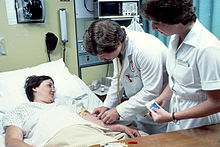Doctor-patient relationship
The relationship between a doctor and a patient is a very important part of medicine. Only when there is a good relationship between the two is it possible to have high-quality healthcare. This relationship is also at the base of medical ethics. Many medical schools teach the doctors to be to keep a professional relationship with their patients, to respect the patients' dignity and privacy.

This relationship has asymmetric information though. The doctor knows more than the patient, but has to explain the patient's situation, and has to ask the patient what treatments should be done. There is a very similar relationship between the patient and nurses, psychologists.
There are different legal norms that regulate this relationship. Examples of such norms are the Hippocratic oath, the Declaration of Geneva. Professional responsibility may also govern such a relationship.
Ideally, patient and doctor trust each other. If they do, this can have a positive influence on the development of disease or condition. Healing can be hindered if the patient does not take the prescribed drugs, of if these drugs are not taken in the doses prescribed.
If the relationship is too good this can preclude efficiency. In certain cases, it may be good to get the opinion of a second doctor, regarding a condition.
Other websites
change- Alexander GC, Casalino LP, Meltzer DO (August 2003). "Patient-physician communication about out-of-pocket costs". JAMA. 290 (7): 953–8. doi:10.1001/jama.290.7.953. PMID 12928475. S2CID 43568685.
{{cite journal}}: CS1 maint: multiple names: authors list (link)